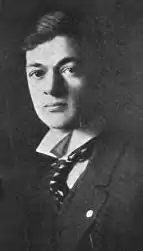Wray Physioc
Wray Bartlett Physioc (November 23, 1890 – May 8, 1933) was an American film director, producer and artist.[1] His film The Gulf Between (1917) was the first Technicolor film ever produced.[2][3]
Wray Physioc | |
|---|---|
 from the Exhibitors' Times (1913) | |
| Born | Wray Bartlett Physioc November 23, 1890 |
| Died | May 8, 1933 (aged 42) Manhattan, New York, US |
| Occupation | Film director |
Early years
Wray Physioc was born on November 23, 1890 in Columbia, South Carolina to Joseph Physioc and Martha Johnson.[4] His older brother was cinematographer Lewis Physioc.[5]
Career
Wray Physioc first entered the film industry when he acted in the 1911 short film The Wrong Bottle and was a charge scenic artist for the French film equipment and production company Pathé-Frères.[2]
In January 1913, Physioc organized the Directors Film Corporation and Ramo Films, which was the brand name for films produced by the Directors Film Corporation.[6] Ramo Films would release two short films per week: a comedy directed by Epes Winthrop Sargent, and a drama directed by Physioc.[6] In March 1913, it was claimed that Physioc was the youngest director in the film industry at just 22 years of age.[7] In a surprise move in July 1913, Physioc resigned as Ramo Films' Director of Productions and the next month he was Manager of Productions at General Film Company.[8][9]
In 1914, he directed Hearts of Oak for the Mohawk Film Co. However, during production Physioc was on a schooner preparing for a scene when a premature explosion occurred forcing him to leap overboard and causing burns to his face and neck.[10][11] By July 1915, he would be a director for Biograph Company and spent two years there.[2][12][13]
In 1917, Physioc directed The Gulf Between, which was a critical and commercial failure but notable in that it was one of the first color films ever produced and the first to use Technicolor.[14]
In 1919, he was directing a series of weekly shorts entitled Facts and Follies which were produced by Bernarr Macfadden for the Pioneer Film Corporation.[15][16][17] In 1921, Physioc formed his own production company in New York: Wray Physioc Productions.[2][13] In February 1922, it was announced that Physioc and the distribution company Wid Gunning, Inc. had come to an agreement to distribute four Wray Physioc Productions, beginning with The Madness of Love (1922).[18] However, a fourth film was never released.
In the mid-1920s, Physioc spent a couple years in the West Indies directing films before returning to New York in March 1928.[1]
Physioc died on May 8, 1933 in Manhattan, New York.[19]
Personal life
Wray Physioc was married to actress Mary Alden.[20][21][22] By the early 1920s, Wray Physioc lived and worked in New York City.[2]
Selected filmography
As director
- Hearts of Oak, (1914)
- The Shadow of a Doubt, (1916)
- The Gulf Between (1917)
- Human Clay, (1918)
- The Madness of Love, (1922)
- The Blonde Vampire, (1922)
- The Love Nest, (1922)
References
- Quigley Publishing Company; Quigley Publishing Company (1928). Exhibitors Herald and Moving Picture World (Jan–Mar 1928). Media History Digital Library. Chicago, Quigley Publishing Company.
- "Wray Physioc – Ypres". artoftheprint.com. Retrieved June 14, 2018.
- "The Dawn of Technicolor | Presentation with film excerpts | Präsentation mit Filmausschnitten". www.berlinale.de. Retrieved June 14, 2018.
- "Massachusetts Marriages, 1841–1915", database with images, FamilySearch(https://familysearch.org/ark:/61903/1:1:N4NM-9C3 : May 25, 2018), Wray B Physioc and Mary L Rohmere, Oct 23; citing Massachusetts, United States, State Archives, Boston; FHL microfilm 2,411,237.
- "Lewis Physioc | Biography, Movie Highlights and Photos | AllMovie". AllMovie. Retrieved June 25, 2018.
- Slide, Anthony (1990). The American Film Industry: A Historical Dictionary. Limelight Editions. p. 169. ISBN 1578860156.
- Motography (Jan–Jun 1913). MBRS Library of Congress. Electricity Magazine Corp. 1913.CS1 maint: others (link)
- Exhibitors' Times. W.A. Johnston. 1913.
- Moving Picture News (Jul – Oct 1913). MBRS Library of Congress. Cinematograph Publishing Company. 1913–17.CS1 maint: others (link)
- "Image 8". The Washington times (LAST AND HOME ed.). April 15, 1914. p. 8. ISSN 1941-0697. Retrieved June 28, 2018.
- "Image 8". The Ogden standard (4 P.M. City ed.). Ogden City, Utah. April 15, 1914. ISSN 2163-4793. Retrieved June 28, 2018.
- New York, Chalmers Publishing Company (1915–17). Moving Picture World (Jul–Sep 1915). Media History Digital Library. New York, Chalmers Publishing Company.
- Motion Picture News, Inc (1918). Motion Picture Studio Directory and Trade Annual (1918). New York The Museum of Modern Art Library. New York, Motion Picture News, Inc.
- "The first Technicolor film was a total disaster a century ago". CNET. September 9, 2017. Retrieved June 27, 2018.
- Moving Picture Exhibitors' Association (1907). The Moving picture world. California State Library. New York : The World Photographic Publishing Company.
- Chalmers Publishing Company; Chalmers Publishing Company (1919). Moving Picture World (Sep 1919). New York The Museum of Modern Art Library. New York, Chalmers Publishing Company.
- Moving Picture Exhibitors' Association (1907). The Moving picture world. California State Library. New York : The World Photographic Publishing Company.
- Motion Picture Daily: Formerly Exhibitors Daily Review and Motion Pictures Today. Exhibitors Trade Review, Incorporated. 1921.
- "New York City City Municipal Deaths, 1795–1949", database, FamilySearch(https://familysearch.org/ark:/61903/1:1:2WK8-PRK : February 10, 2018), Wray Physioc, May 8, 1933; citing Death, Manhattan, New York City, United States, New York Municipal Archives, New York; FHL microfilm 2,070,582.
- Moving Picture News (Jul – Oct 1913). MBRS Library of Congress. Cinematograph Publishing Company. 1913–17.CS1 maint: others (link)
- "Motion Picture Classic". Motion Picture Classic. Brooklyn, New York. 1–2. 1915. OCLC 1758765.
- Picture-Play Weekly (Oct–Nov 1915). MBRS Library of Congress. Street & Smith. 1915.CS1 maint: others (link)